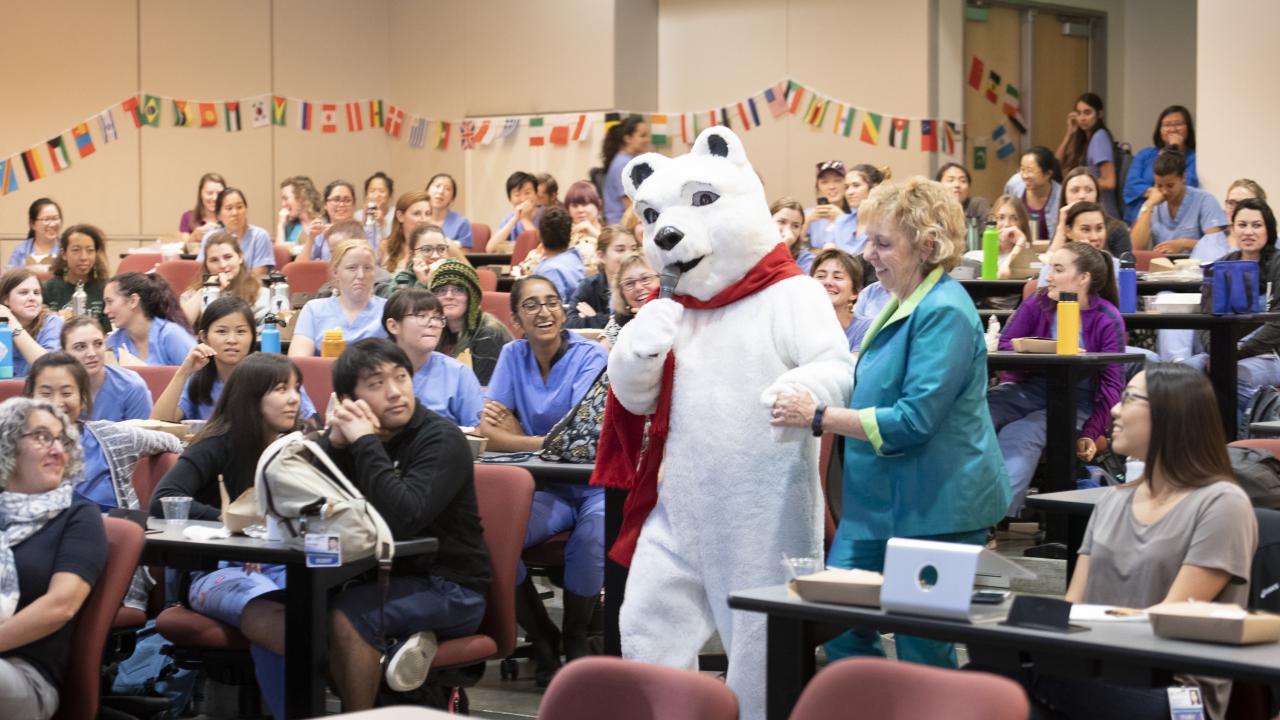
Global Programs Day—What Can the Veterinary Community do to Address the Impacts of Climate Change?
The school celebrated its inaugural Global Programs Day with a lunch seminar addressing climate change and an evening presentation by students who completed summer externships and fellowships around the world.
Dr. Pat Conrad, associate dean of Global Programs, opened the seminar “What Can the Veterinary Community do to Address the Impacts of Climate Change?” with a broad look at some of the impacts of climate change on the health of animals, people and the environment they share. Veterinary experts provided their perspective and talked about how their field has been impacted by climate change.
Dr. John Madigan, professor of equine medicine, used an engaging slide show to talk about his role in leading the Veterinary Emergency Response Team (VERT)—a disaster response crew comprised of faculty, students and staff—in the aftermath of several large wildfires in California in recent years. As climate changes, he explained that we are more likely to see an increase in natural disasters (wildfires, floods and other severe weather events) and how important it is to have first responders trained in animal rescue.
He laid out a few bullet points of what people can do to be involved:
--Get training in disaster response.
--Engage in your community to prepare and respond.
--Participate in rescue efforts or in supporting them.
At times, being in the middle of a disaster response can be overwhelming, Madigan said. There may be many animals in need of help, but he approaches the task one animal at a time.
Dr. Krystle Reagan, an infectious disease fellow, spoke about the changing epidemiology of diseases such as Valley Fever. This fungus lives in the soil and aerosolizes. When rains increase, the soil numbers increase and then hot, dry summers promote the transmission of the fungus that affects dogs, humans, horses and other large animals. It’s also associated with natural disasters. California reported the highest annual number of new cases in 2017 and as climate changes, the fungus is moving farther north and closer to urban areas.
In some cases, emerging infectious diseases that affect humans are first noted by veterinarians who find it in an animal. That was the case with Cyptococcus gattii, noted by a veterinary pathologist in 2001. Its recent emergence is also tied to climate change, Reagan said. With vector borne diseases, the ticks or mosquitoes that carry various diseases are spreading their distribution geographically based on changes in extreme weather.
Dr. Woutrina Smith, an epidemiologist with the One Health Institute and leader of the Planetary Health Center of Expertise, explained how when she was veterinary student at UC Davis, she never would have imagined being here as faculty now talking about climate change. She then challenged the veterinary students, faculty and staff in the audience to engage professionally by raising awareness with clients and stakeholders about the need to prepare for shifts in climate and weather events in their area. Her question to the audience about what daily climate-friendly choices they can each make, prompted a response from a polar bear sitting in the back of the room. The bear shared his personal concern about the impact of climate change on his northern habitat and availability of food sources. To the delight of the audience, the bear revealed himself as Dean Michael Lairmore.
The evening’s events featured 11 veterinary students and one MPVM student who received International Summer Externships and Global Fellowships to explore professional opportunities around the globe. The audience was treated to videos and stories about research and life-changing experiences in Sri Lanka, Tanzania, Scotland, Brazil, Costa Rica, South Africa and Ireland. All of their opportunities were made possible in part by generous donors to Global Programs.
